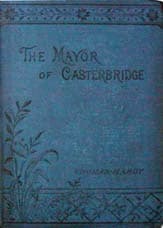The Mayor of Casterbridge
Critique • Quotes
 First edition, 1886, in two volumes
First edition, 1886, in two volumesOriginally called
The Mayor of Casterbridge: The Life and Death of a Man of Character
First published
1886
Literary form
Novel
Genres
Literary
Writing language
English
Author's country
England
Length
Approx. 127,000 words
A Hardy roller-coaster
I don't know whether it's still being taught to teens but The Mayor of Casterbridge turned me off Thomas Hardy for many years after studying it in high school. Too melodramatic, too full of ridiculous coincidences and twists of fate, like a soap opera. And way too old-fashioned for my youthful heart. What did I care about some British townspeople getting all hot and bothered over some personal intrigues?
Years later, film adaptations brought me back repeatedly to Hardy's other novels and I found them all surprisingly absorbing. I still put off the dreaded Mayor of Casterbridge though, until it was almost all I had left to reread of his work.
And then to my great puzzlement I found it the best of all. What had I read in school? How could it be so different now?
Each year that I've grow older since then, I've found myself appreciating Hardy more. I realize my saying this is not going to endear him to young readers—quite the opposite. But somehow Hardy seems more realistic when one has more life experience to catch up to his enduring insights into the human condition.
That's a mouthful. But as an aging adult, I am no longer concerned about the unlikelihood of the coincidences and the artificiality of the cruel fortunes that affect his characters. These are just unimportant narrative devices to make possible the real drama—be it physical or psychological conflict.
Revelations you won't see coming
And what a roller-coaster of conflict and mental anguish The Mayor of Casterbridge provides.
It starts when the country labourer Michael Henchard gets drunk and sells his wife and young daughter to a sailor at a village fair for five guineas. When he sobers up and realizes what a horrendous thing he's done, he goes looking for them, but he learns the wife, daughter and sailor have left the country. Repentant, he swears off alcohol. Over the years he works hard, becomes rich and eventually is elected the mayor of Casterbridge. But then his wife and her grown-up daughter show up, his reputation is threatened and....
Well, all that just barely sets the scene. There are plenty more characters, more scandal, business and political intrigue, ill-fated love affairs, and at least two surprising revelations I bet you won't see coming.
But, as seemingly unsympathetic as the main character Henchard is, we feel conflicted about him throughout, as he passes through remorse, pride, obstinacy, vengefulness, resentment, jealousy and humiliation. He'd be a great Shakespearean tragic character, a King Lear perhaps, except like many of Hardy's characters he seldom verbalizes his emotions—no howling against the elements for him. No other character in Casterbridge either, except perhaps the daughter, is depicted with completely pure motives—purely good, purely self-serving or otherwise. The reader's empathy is tossed back and forth, trampled on and then redeemed when least expected.
After all this blathering I feel I still have not explained very well why I long ago gave up my old idea of The Mayor of Casterbridge as an unbelievable and boring soap opera. Read it to see for yourself.
And if you don't get it, wait a few more years, give yourself time to grow wiser about the world, and try it again.
— Eric
Critique • Quotes

